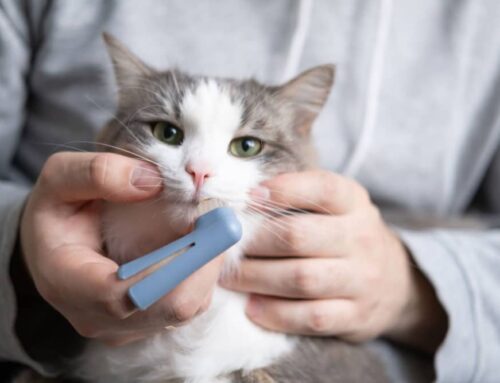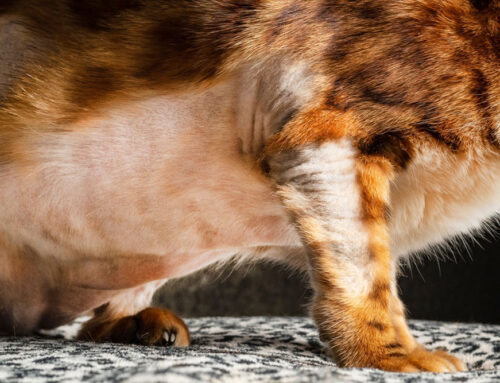Cats can suffer from allergies, but their physical reactions may be different than those of people. If left untreated, your whiskered friend’s allergies can cause discomfort and affect their quality of life. Understanding allergic reactions’ causes, signs, and management is crucial for providing your cat with the care they need. Our Just Cats Clinic team explains feline allergies to help you effectively recognize and address your cat’s issues.
Allergy causes in cats
Your cat can be allergic to any substance, many of which are in or around your home. Common feline allergy causes include:
- Flea allergy dermatitis (FAD) — Flea bites often cause an allergic reaction in cats. Some cats are hypersensitive to flea saliva, and they can experience intense itching and skin inflammation from a single flea bite.
- Food allergies — Cats can develop allergies to certain ingredients in their food, such as proteins, including chicken, beef, or fish, or grains such as wheat or corn. This manifests as vomiting shortly after eating. It’s often the underlying reason for “My cat eats too fast and then throws up”.
- Environmental allergies — Environmental or seasonal allergies can wreak havoc on your four-legged companion. Cats can be allergic to pollen, mold, grasses, dust, dust mites, and other environmental allergens. These allergic reactions often manifest as upper respiratory conditions, including coughing, sneezing, and runny eyes.
- Contact allergies — These allergies result from cats coming into contact with reaction-causing substances or materials, including carpets and fabric dyes, laundry soaps, household cleaners, and plastics.
- Chemical inhalants — Certain cats are allergic to cigarette and other smoke, perfumes, and essential oils.
Allergy signs in cats signs
Most cats’ allergies manifest as skin itchiness and inflammation. Allergic reactions are caused by a compromised immune system and can result in the following signs:
- Scratching and licking — Constant skin scratching, licking, or chewing is a common allergy sign in cats.
- Skin irritation — Allergic reactions can lead to redness, swelling, and skin lesions, especially around the face, ears, neck, and paws.
- Hair loss — Excessive grooming as a result of itchiness can cause bald patches and skin abrasions.
- Respiratory conditions — Some cats with environmental allergies may exhibit sneezing, coughing, wheezing, or watery eyes.
- Digestive issues — If your cat is affected by a food allergy, they may experience digestive issues such as vomiting or diarrhea.
Treatment for allergies in cats

Although allergies cannot be cured, our Just Cats Clinic team can manage your whiskered pal’s signs. Treatment depends on the allergen to which your cat is reactive, but our team often manages pets’ allergies through the following methods:
- Flea control — Prevent flea infestations by regularly administering flea preventives to your cat, no matter whether they have FAD, and no matter if they are indoor only. Fleas may not only cause allergies but they also carry severe illnesses. Our Just Cats Clinic veterinarian can prescribe the most effective flea control products for your whiskered pal. This is the cheapest and most effective allergy control out there and can fix 90% of allergy issues. And if you need to see a Veterinary Dermatologist – they will require your cat to be on prevention.
- Dietary management — If our veterinarian suspects your cat has a food allergy, they may recommend a hypoallergenic or elimination diet to identify and eliminate the offending ingredient. Some cats may be allergic to a food’s dyes, additives, or preservatives. We can recommend a hypoallergenic food that is tolerable for your cat.
- Environmental modifications — Minimize your furry pal’s exposure to environmental allergens by using air purifiers, vacuuming frequently, and washing their bedding and blankets regularly. Choose dust-free and unscented cat litter for cats who have dust or inhalant allergies.
- Medications — Our team may prescribe antihistamines, corticosteroids, and other drugs to alleviate itching and inflammation.
- Allergy testing — In severe or chronic allergy cases, allergy testing may be recommended to identify specific triggers. This can help us tailor your cat’s treatment plan to resolve their signs.
- Immunotherapy — Also known as allergy shots, immunotherapy aims to desensitize your cat to known allergens gradually.
Allergies can cause your cat discomfort and health problems. However, your whiskered pal can experience a comfortable and itch-free life when you understand their signs, allergens, and treatment. If you suspect your cat suffers from allergies, schedule an appointment with our Just Cats Clinic team so we can make a definitive diagnosis and recommend effective treatment.













